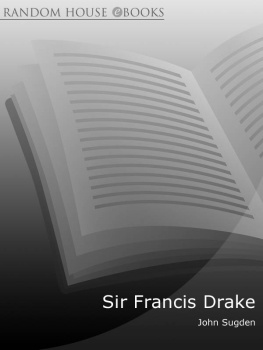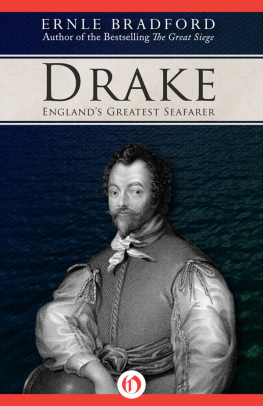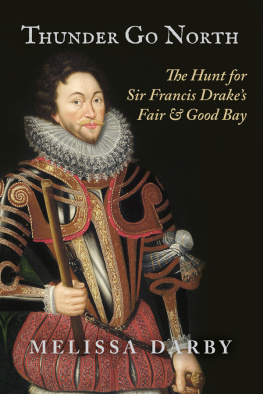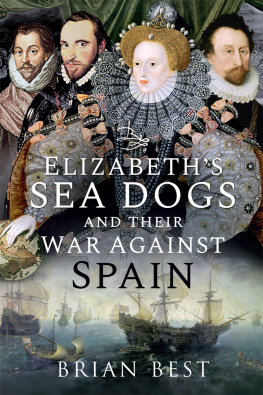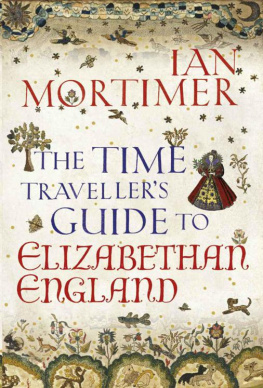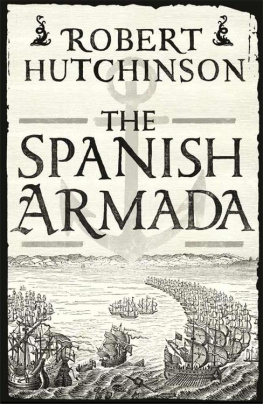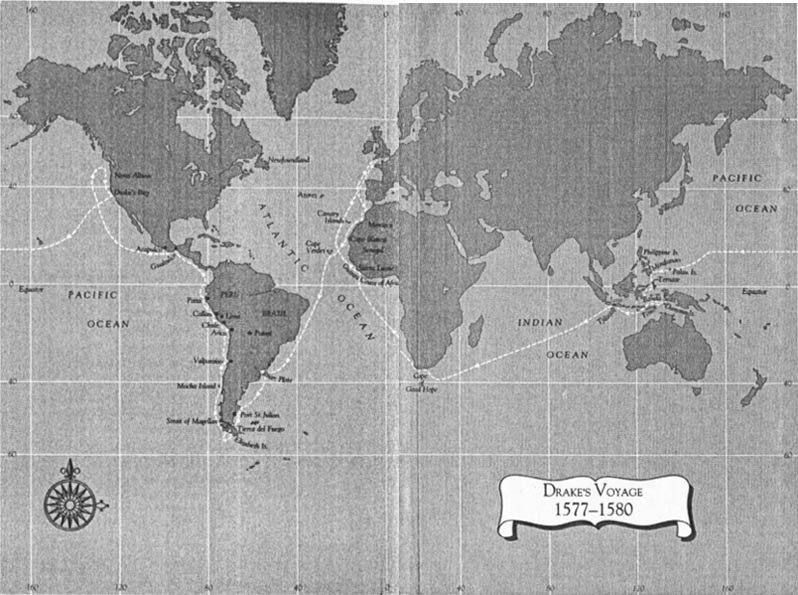C ONTENTS
About the Author
The recipient of numerous awards, John Sugden has degrees from three British universities and was formerly a lecturer and senior research fellow. His most recent book, Nelson: A Dream of Glory, (Cape, 2004) achieved great critical success. Dr Sugden is now working on a sequel, Nelson: The Years of Acclaim.
L IST OF I LLUSTRATIONS
Francis Russell, 2nd Earl of Bedford
Sir John Hawkins
Church of St Budeaux, Plymouth
Walter Devereux, 1st Earl of Essex
Sir John Norris
Edward Clinton, Earl of Lincoln
Sir Francis Walsingham
Elizabeth 1
Abraham Orteliuss world map, 1570
Philip II
Nicola Van Sypes Map of Drakes Voyage
Sir Francis Drake, 1581
Sir Francis Drake
Buckland Abbey
Elizabeth Sydenham
Combe Sydenham House
Dom Antonio
Robert Dudley, Earl of Leicester
Drakes attack on Cartagena
Charles, Lord Howard of Effingham
Plymouth Fort
Plymouth and Drakes Leat
Sir Francis Drake, 1591
Terence Morgan as Sir Francis Drake
Boehms statue of Drake
The Game of Bowls
Maps
Drakes Voyage, 15771580
The West Indies and the Spanish Main
The Iberian Peninsula
The Battles in the Channel, 1588
This book is for Terri, as promised
P REFACE
Few have enjoyed as great a reputation as Sir Francis Drake. In his own day he was the most celebrated of Englishmen, as famous in Europe and America, it was said, as Tamburlaine was in Africa and Asia. There was a lively trade in portraits and ephemera, and dispatches from London, Paris, Antwerp, Madrid, Rome and Venice were full of his name. Even enemies were stirred to admiration. Just look at Drake! cried Pope Sixtus V ruefully. Who is he? What forces has he? And yet he burned twenty-five of the Kings ships at Gibraltar, and as many again at Lisbon. He has robbed the flotilla, and sacked San Domingo. His reputation is so great that his countrymen flock to him to share his booty. We are sorry to say it, but we have a poor opinion of this Spanish Armada, and fear some disaster. Indeed, so remarkable did Drakes successes seem that the superstitious attributed them to his mastery of the black arts. Defeated mariners and soldiers of Spains Armada came home in 1588 protesting that Sir Francis Drake was a devil, and no man!
Drake died aboard his flagship, the Defiance, off the island of Buena Ventura, Panama, on 28 January 1596. The English took his body the remaining league to the Spanish town of Puerto Bello, which they seized. The following day Drakes followers carried the admiral out of the estuary to the deeper water west or south-west of Bajo Salmedina island and laid him to rest in the time-honoured fashion of the sailor. More than four hundred years have now passed since that final act, and Drakes name is still a household word. His career has fascinated people as diverse as the British novelist Graham Greene and the American admiral Chester Nimitz, and inspired Montgomery, Churchill and Margaret Thatcher to stand firm in times of adversity. But there is less agreement about his historical significance. A German statue, raised in the nineteenth century, claimed that he had introduced Europe to the potato. To historian J. B. Black he was the most brilliant of the Elizabethans, while A. L. Rowse regarded him as the greatest sailor in the history of the world. Others, however, cast him as merely the quintessential story-book hero or, worse, a greedy filibuster whose raids distracted England from the pursuit of more peaceful and profitable endeavours.
Drake has always been a controversial figure, of course. When I wrote this book nearly twenty years ago, he was commonly a prisoner of two competing academic traditions. The older stemmed from Julian Corbetts monumental biography, Drake and the Tudor Navy (1898), which linked him with the increasing sophistication, scale and scope of English naval operations. It presented Drake as the most important founder of the naval tradition that ultimately gave Britain the empire of the seas. The other approach was the predictable reaction of scholars trying to break new ground. It conversely underscored the immaturity of the official Elizabethan navy, and firmly located Drake within the context of private commercial warfare and privateering. Between the two perspectives, Drakes reputation shifted uneasily . The first paraded his successes and tended to the laudatory. The second, in its emphasis upon failures and failings, was sometimes less than just to both Drake and the navy.
A major academic reappraisal of Drake was overdue, but my involvement in other long-term projects precluded such a protracted work, and it occurred to me that an up-to-date popular work might serve a useful if ultimately intermediate purpose. It should try to rescue Drake from the extremes of the prevailing interpretations, while recognizing that both embodied essential truths, and it should attempt a rounded biography of the man, rather than repeat the conventional collection of voyages. For there was another remarkable but overlooked dimension to the common story of a great sailor: the rise from poverty to international significance of a man who lived in a society which enshrined status and birth as almost paramount. Several factors facilitated Drakes astonishing social climb. The first was the expansion of the Tudor state, which demanded more talent than high birth could supply. The second was Drakes unusual combination of abilities. He was not only remarkably skilled in informal sea warfare, commanding thereby paths to dramatic self-enrichment, but beyond most fellow sailors was intelligent, literate and extremely vocal, qualities necessary to win support in influential circles. As far as the record allowed, I hoped to suggest the means by which Drake advanced in Elizabeths England and the adjustments success forced upon him, his search for patrons, his efforts to legitimize growing status through public service and the acquisition of property, and his endeavours to establish a heritable line. I therefore wrote of Drake the businessman, property magnate, civic leader, parliamentarian and magistrate as well as Drake the bold sea rover.
Since this book is intended for the general reader, rather than the specialist, it is not encumbered with exhaustive footnotes, but some are indispensable to identify quotations or to indicate principal or disparate sources of information. In quoting from primary sources I have modernized spelling and punctuation to facilitate reading, but the integrity of the passages has been preserved. Throughout, dates are given Old Style, since that was the calendar used in the England of Drakes day. This new edition has corrected a few typographical errors, and in a postscript briefly reviews research that has appeared in the last fifteen years.
My debts are many. Above all, thanks go to my brother, Philip, who not only urged me to undertake this project, reviewed the chapters and brought to the deciphering of original manuscripts a remarkable facility with Elizabethan script, but also handled part of the research while I was abroad. Without his assistance and encouragement the book would not have been finished. I am also indebted to the Public Record Office, the British Library, the London Library, the University of London Library, the Institute of Historical Research and the National Portrait Gallery, all in London; the West Country Studies Library and Devonshire Record Office, Exeter; the West Devon Record Office, Art Gallery and Public Library in Plymouth; Buckland Abbey, now in the hands of the National Trust; the National Maritime Museum, Greenwich; the Somerset Record Office, Taunton; the university libraries of Warwick, Leeds and Cambridge; the Kingston-upon-Hull Public Library; and the Newberry Library, Chicago. Dr Richard T. Spence gave me an early grounding in Tudor and Stuart maritime history. Terri Egginton drove me around many of Drakes West Country haunts, and Raymond F. Aker of Palo Alto, California, then President of the Drake Navigators Guild, generously placed the results of his detailed forty-year enquiries into Drakes voyages at my disposal. Sadly, Ray died in January 2003, at the age of eighty-two. He was a good and frank friend, and perhaps the most dedicated in a line of great American Drake scholars, applying a professional knowledge of ships, the sea and seamanship to field and documentary research. Michael Turner, who has followed the routes of Drakes travels worldwide, put me right on some matters of geography. Three editors, Julian Shuckburgh, Jack Macrae and Will Sulkin, all suggested improvements to the manuscript. A book, like a ship, requires many willing hands, and without their cooperation and enthusiasm I fear this one would never have left the stocks.
Next page
